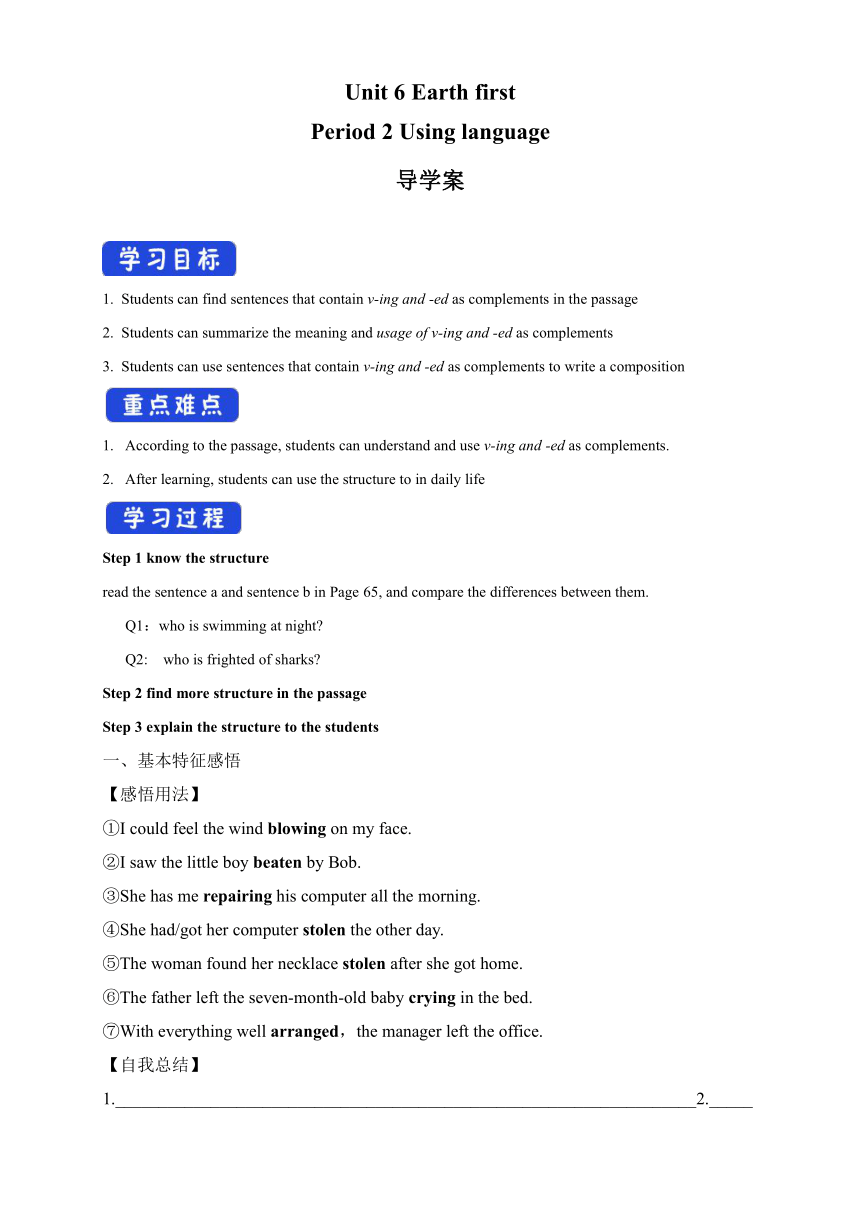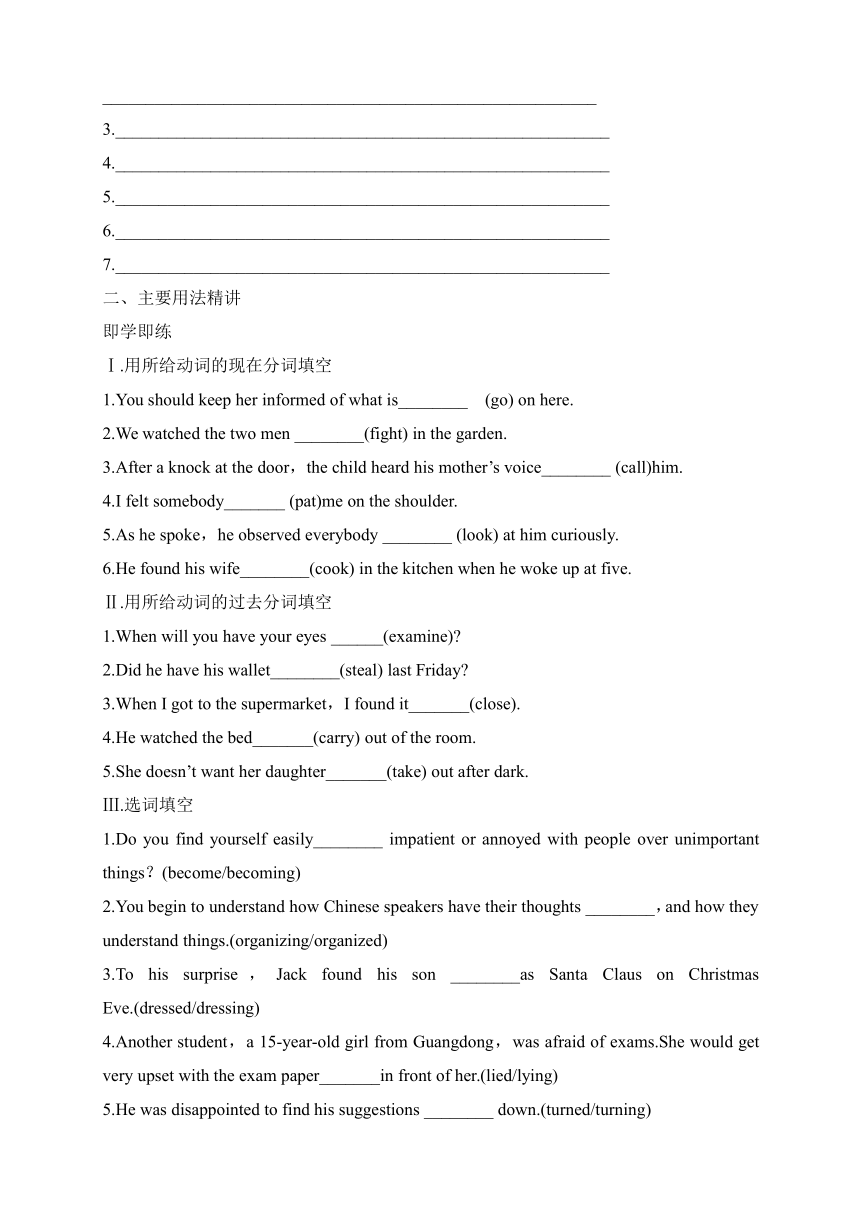外研版(2019)必修第二册Unit6 Earth firstUsing Language 导学案(2)
文档属性
| 名称 | 外研版(2019)必修第二册Unit6 Earth firstUsing Language 导学案(2) |  | |
| 格式 | zip | ||
| 文件大小 | 38.2KB | ||
| 资源类型 | 教案 | ||
| 版本资源 | 外研版(2019) | ||
| 科目 | 英语 | ||
| 更新时间 | 2022-08-22 20:28:45 | ||
图片预览


文档简介
Unit 6 Earth first
Period 2 Using language
导学案
Students can find sentences that contain v-ing and -ed as complements in the passage
Students can summarize the meaning and usage of v-ing and -ed as complements
Students can use sentences that contain v-ing and -ed as complements to write a composition
According to the passage, students can understand and use v-ing and -ed as complements.
After learning, students can use the structure to in daily life
Step 1 know the structure
read the sentence a and sentence b in Page 65, and compare the differences between them.
Q1:who is swimming at night
Q2: who is frighted of sharks
Step 2 find more structure in the passage
Step 3 explain the structure to the students
一、基本特征感悟
【感悟用法】
①I could feel the wind blowing on my face.
②I saw the little boy beaten by Bob.
③She has me repairing his computer all the morning.
④She had/got her computer stolen the other day.
⑤The woman found her necklace stolen after she got home.
⑥The father left the seven-month-old baby crying in the bed.
⑦With everything well arranged,the manager left the office.
【自我总结】
1.___________________________________________________________________2.______________________________________________________________
3._________________________________________________________
4._________________________________________________________
5._________________________________________________________
6._________________________________________________________
7._________________________________________________________
二、主要用法精讲
即学即练
Ⅰ.用所给动词的现在分词填空
1.You should keep her informed of what is________ (go) on here.
2.We watched the two men ________(fight) in the garden.
3.After a knock at the door,the child heard his mother’s voice________ (call)him.
4.I felt somebody_______ (pat)me on the shoulder.
5.As he spoke,he observed everybody ________ (look) at him curiously.
6.He found his wife________(cook) in the kitchen when he woke up at five.
Ⅱ.用所给动词的过去分词填空
1.When will you have your eyes ______(examine)
2.Did he have his wallet________(steal) last Friday
3.When I got to the supermarket,I found it_______(close).
4.He watched the bed_______(carry) out of the room.
5.She doesn’t want her daughter_______(take) out after dark.
Ⅲ.选词填空
1.Do you find yourself easily________ impatient or annoyed with people over unimportant things?(become/becoming)
2.You begin to understand how Chinese speakers have their thoughts ________,and how they understand things.(organizing/organized)
3.To his surprise,Jack found his son ________as Santa Claus on Christmas Eve.(dressed/dressing)
4.Another student,a 15-year-old girl from Guangdong,was afraid of exams.She would get very upset with the exam paper_______in front of her.(lied/lying)
5.He was disappointed to find his suggestions ________ down.(turned/turning)
6.In the morning people woke up and found the world outside their houses completely ________.(changing/changed)
7.His words were very ________,and everyone was________ by what he had said.(frightening/frightened)
8.The mother can’t stand to see her baby________ alone at home.(leaving/left)
Step 4 Do exercises in Page65
Step V Homework
【答案】
Step 1 know the structure
read the sentence a and sentence b in Page 65, and compare the differences between them.
Q1:who is swimming at night
A woman
Q2: who is frighted of sharks
People
一、基本特征感悟
【感悟用法】
①I could feel the wind blowing on my face.
②I saw the little boy beaten by Bob.
③She has me repairing his computer all the morning.
④She had/got her computer stolen the other day.
⑤The woman found her necklace stolen after she got home.
⑥The father left the seven-month-old baby crying in the bed.
⑦With everything well arranged,the manager left the office.
【自我总结】
1.句①为“感官动词+宾语+doing”,动词-ing形式作宾补强调动作的延续性,表示动作正在进行。
2.句②为“感官动词+宾语+done”(动词-ed形式作宾补,表示被动)
3.句③为使役动词“have/has+宾语+doing”(动词-ing形式作宾补,表示主动)
4.句④为使役动词“have/got+宾语+done”(动词-ed形式作宾补,表示被动)
5.句⑤为“find+宾语+done”,“发现……被……”,动词-ed形式表被动。
6.句⑥为“leave+宾语+doing”,“让、听任……保持”,动词-ing形式表主动。
7.句⑦为“with/without+宾语+done”,“随着……被……”动词-ed形式表被动。
二、主要用法精讲
1.动词-ing形式作宾补时,动词与宾语之间存在主谓关系,且强调正在进行的主动动作。可接动词-ing形式作宾补的常见动词:感官动词(see,watch,observe,notice,hear,listen,feel),使役动词(have,get),find,leave,keep,catch等。
Listen! Do you hear someone calling for help
听!你听到有人正在呼喊救命吗?
2.动词-ed形式作宾补时,动词与宾语之间存在动宾关系。可接动词-ed形式作宾补的常见动词:感官动词(see,watch,observe,notice,hear,listen,feel),使役动词(have,make,let,get),find,leave,keep等。
Jenny hopes that Mr.Smith will suggest a good way to have her written English improved in a short period.珍妮希望史密斯先生会建议一个好的方法以使她的英语写作在短期内得到提升。
Before driving into the city,you are required to get your car washed.
在开车进城之前,你需要找人洗洗车。
即学即练
Ⅰ.用所给动词的现在分词填空
1.You should keep her informed of what is going(go) on here.
2.We watched the two men fighting(fight) in the garden.
3.After a knock at the door,the child heard his mother’s voice calling(call)him.
4.I felt somebody patting (pat)me on the shoulder.
5.As he spoke,he observed everybody looking (look) at him curiously.
6.He found his wife cooking(cook) in the kitchen when he woke up at five.
Ⅱ.用所给动词的过去分词填空
1.When will you have your eyes examined (examine)
2.Did he have his wallet stolen(steal) last Friday
3.When I got to the supermarket,I found it closed(close).
4.He watched the bed carried(carry) out of the room.
5.She doesn’t want her daughter taken(take) out after dark.
Ⅲ.选词填空
1.Do you find yourself easily becoming impatient or annoyed with people over unimportant things?(become/becoming)
2.You begin to understand how Chinese speakers have their thoughts organized,and how they understand things.(organizing/organized)
3.To his surprise,Jack found his son dressed as Santa Claus on Christmas Eve.(dressed/dressing)
4.Another student,a 15-year-old girl from Guangdong,was afraid of exams.She would get very upset with the exam paper lying in front of her.(lied/lying)
5.He was disappointed to find his suggestions turned down.(turned/turning)
6.In the morning people woke up and found the world outside their houses completely changed.(changing/changed)
7.His words were very frightening,and everyone was frightened by what he had said.(frightening/frightened)
8.The mother can’t stand to see her baby left alone at home.(leaving/left)
Period 2 Using language
导学案
Students can find sentences that contain v-ing and -ed as complements in the passage
Students can summarize the meaning and usage of v-ing and -ed as complements
Students can use sentences that contain v-ing and -ed as complements to write a composition
According to the passage, students can understand and use v-ing and -ed as complements.
After learning, students can use the structure to in daily life
Step 1 know the structure
read the sentence a and sentence b in Page 65, and compare the differences between them.
Q1:who is swimming at night
Q2: who is frighted of sharks
Step 2 find more structure in the passage
Step 3 explain the structure to the students
一、基本特征感悟
【感悟用法】
①I could feel the wind blowing on my face.
②I saw the little boy beaten by Bob.
③She has me repairing his computer all the morning.
④She had/got her computer stolen the other day.
⑤The woman found her necklace stolen after she got home.
⑥The father left the seven-month-old baby crying in the bed.
⑦With everything well arranged,the manager left the office.
【自我总结】
1.___________________________________________________________________2.______________________________________________________________
3._________________________________________________________
4._________________________________________________________
5._________________________________________________________
6._________________________________________________________
7._________________________________________________________
二、主要用法精讲
即学即练
Ⅰ.用所给动词的现在分词填空
1.You should keep her informed of what is________ (go) on here.
2.We watched the two men ________(fight) in the garden.
3.After a knock at the door,the child heard his mother’s voice________ (call)him.
4.I felt somebody_______ (pat)me on the shoulder.
5.As he spoke,he observed everybody ________ (look) at him curiously.
6.He found his wife________(cook) in the kitchen when he woke up at five.
Ⅱ.用所给动词的过去分词填空
1.When will you have your eyes ______(examine)
2.Did he have his wallet________(steal) last Friday
3.When I got to the supermarket,I found it_______(close).
4.He watched the bed_______(carry) out of the room.
5.She doesn’t want her daughter_______(take) out after dark.
Ⅲ.选词填空
1.Do you find yourself easily________ impatient or annoyed with people over unimportant things?(become/becoming)
2.You begin to understand how Chinese speakers have their thoughts ________,and how they understand things.(organizing/organized)
3.To his surprise,Jack found his son ________as Santa Claus on Christmas Eve.(dressed/dressing)
4.Another student,a 15-year-old girl from Guangdong,was afraid of exams.She would get very upset with the exam paper_______in front of her.(lied/lying)
5.He was disappointed to find his suggestions ________ down.(turned/turning)
6.In the morning people woke up and found the world outside their houses completely ________.(changing/changed)
7.His words were very ________,and everyone was________ by what he had said.(frightening/frightened)
8.The mother can’t stand to see her baby________ alone at home.(leaving/left)
Step 4 Do exercises in Page65
Step V Homework
【答案】
Step 1 know the structure
read the sentence a and sentence b in Page 65, and compare the differences between them.
Q1:who is swimming at night
A woman
Q2: who is frighted of sharks
People
一、基本特征感悟
【感悟用法】
①I could feel the wind blowing on my face.
②I saw the little boy beaten by Bob.
③She has me repairing his computer all the morning.
④She had/got her computer stolen the other day.
⑤The woman found her necklace stolen after she got home.
⑥The father left the seven-month-old baby crying in the bed.
⑦With everything well arranged,the manager left the office.
【自我总结】
1.句①为“感官动词+宾语+doing”,动词-ing形式作宾补强调动作的延续性,表示动作正在进行。
2.句②为“感官动词+宾语+done”(动词-ed形式作宾补,表示被动)
3.句③为使役动词“have/has+宾语+doing”(动词-ing形式作宾补,表示主动)
4.句④为使役动词“have/got+宾语+done”(动词-ed形式作宾补,表示被动)
5.句⑤为“find+宾语+done”,“发现……被……”,动词-ed形式表被动。
6.句⑥为“leave+宾语+doing”,“让、听任……保持”,动词-ing形式表主动。
7.句⑦为“with/without+宾语+done”,“随着……被……”动词-ed形式表被动。
二、主要用法精讲
1.动词-ing形式作宾补时,动词与宾语之间存在主谓关系,且强调正在进行的主动动作。可接动词-ing形式作宾补的常见动词:感官动词(see,watch,observe,notice,hear,listen,feel),使役动词(have,get),find,leave,keep,catch等。
Listen! Do you hear someone calling for help
听!你听到有人正在呼喊救命吗?
2.动词-ed形式作宾补时,动词与宾语之间存在动宾关系。可接动词-ed形式作宾补的常见动词:感官动词(see,watch,observe,notice,hear,listen,feel),使役动词(have,make,let,get),find,leave,keep等。
Jenny hopes that Mr.Smith will suggest a good way to have her written English improved in a short period.珍妮希望史密斯先生会建议一个好的方法以使她的英语写作在短期内得到提升。
Before driving into the city,you are required to get your car washed.
在开车进城之前,你需要找人洗洗车。
即学即练
Ⅰ.用所给动词的现在分词填空
1.You should keep her informed of what is going(go) on here.
2.We watched the two men fighting(fight) in the garden.
3.After a knock at the door,the child heard his mother’s voice calling(call)him.
4.I felt somebody patting (pat)me on the shoulder.
5.As he spoke,he observed everybody looking (look) at him curiously.
6.He found his wife cooking(cook) in the kitchen when he woke up at five.
Ⅱ.用所给动词的过去分词填空
1.When will you have your eyes examined (examine)
2.Did he have his wallet stolen(steal) last Friday
3.When I got to the supermarket,I found it closed(close).
4.He watched the bed carried(carry) out of the room.
5.She doesn’t want her daughter taken(take) out after dark.
Ⅲ.选词填空
1.Do you find yourself easily becoming impatient or annoyed with people over unimportant things?(become/becoming)
2.You begin to understand how Chinese speakers have their thoughts organized,and how they understand things.(organizing/organized)
3.To his surprise,Jack found his son dressed as Santa Claus on Christmas Eve.(dressed/dressing)
4.Another student,a 15-year-old girl from Guangdong,was afraid of exams.She would get very upset with the exam paper lying in front of her.(lied/lying)
5.He was disappointed to find his suggestions turned down.(turned/turning)
6.In the morning people woke up and found the world outside their houses completely changed.(changing/changed)
7.His words were very frightening,and everyone was frightened by what he had said.(frightening/frightened)
8.The mother can’t stand to see her baby left alone at home.(leaving/left)
